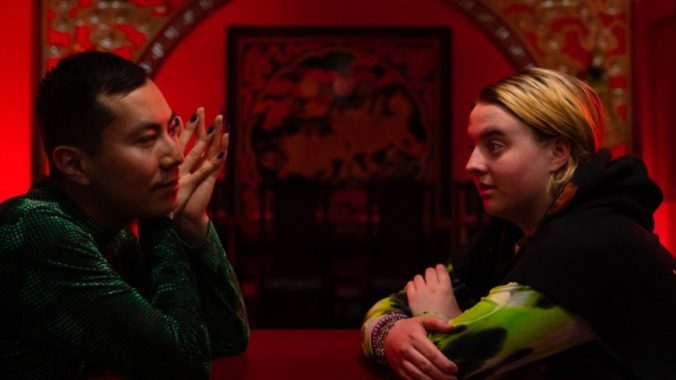Queens of the Qing Dynasty Is an Ornate Meditation on Queerness and Disability

The arc of golden fingernails bends towards queerness. In Ashley McKenzie’s Queens of the Qing Dynasty, the zhijiatao (golden nail covers often worn by Imperial women), are amulets of independence. They represent strength and luxury, a kept status far removed from manual labor, just as they did in the days of the Chinese court.
That is the first of many special lessons An (Ziyin Zheng) shares with their charge. Star (Sarah Walker) has been in and out of the hospital many times. An has been appointed to watch her after her latest suicide attempt. Though she’s 18, Star’s disability prevents her from working or living independently. She has parents, but they don’t seem to care or bother to understand. All she has are her cartoons and the sounds in her head.
But with An, things are different. They feel like the same people somehow. Both feel orphaned by society. Star’s disability and An’s queerness make them outcasts, people the system is not designed to support. This makes for an intense and intimate bond that seems free of inhibitions, for better and worse. The two will share their deepest secrets, their yearnings for a past and their hopes for a future.
Star is a difficult character. On the page, she could easily have been frozen, but Walker makes the dialogue interesting. Though McKenzie’s script seems unsure if Star can develop emotionally, Walker finds little moments to distinguish the Star at the end of the film from the one that wakes up in a hospital bed at the very beginning. Those moments puncture through an otherwise structural performance when Star is with An.
An is a sort of magic cricket, a submissive and kinky cricket who provides Star with a conscience. They tell her about the ways of the world and the wonders of the past through their queer sense of joy. Always flitting around Star’s periphery, An isn’t given a full context. Their life outside the hospital largely appears in vignettes, showing clues to his life beyond Star with her positive and negative influences. She may be an obsessive caller and texter, but Star helps An feel listened to. Star shows them a radical form of self-acceptance they didn’t know existed.
At its profoundly human heart, Queens of the Qing Dynasty wants to say something about the mutual aid and understanding between queerness and disability. There’s no bridge that Celine Dion’s “A New Day Has Come” can’t cross! Star and An both recognize that they each experience the world differently than so-called “normal” people. They are each abandoned by a system that dead-ends in homelessness—Star as a person needing care from a for-profit healthcare system, An as a queer international student at risk of deportation. The pair bond over this rootless, suspended state of being.
-

-

-

-

-

-

-

-

-

-

-

-

-

-

-

-

-

-

-

-

-

-

-

-

-

-

-

-

-

-

-

-

-

-

-

-

-

-

-

-








































